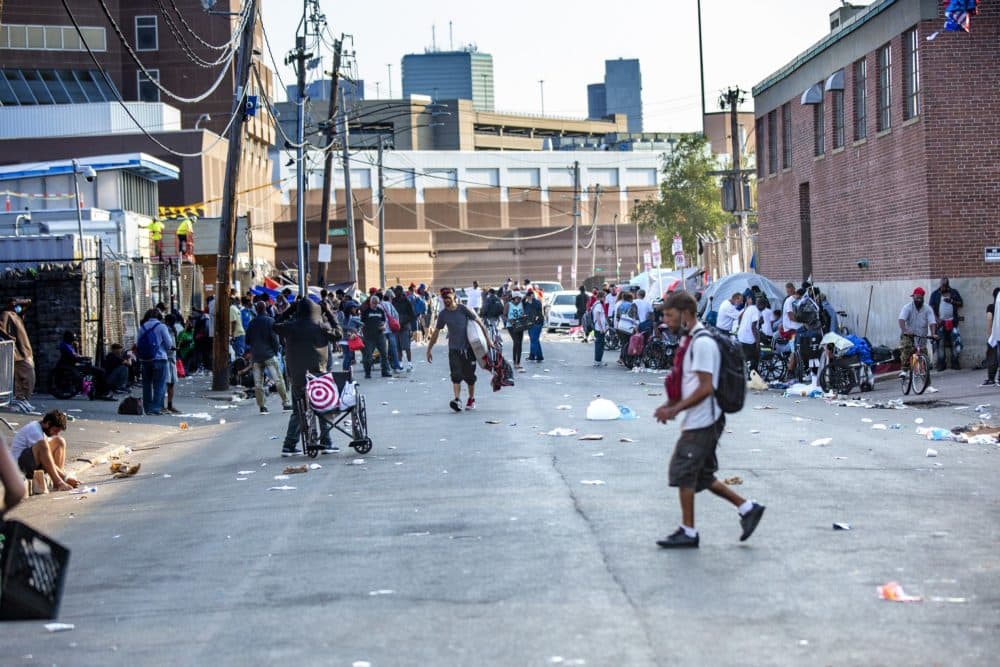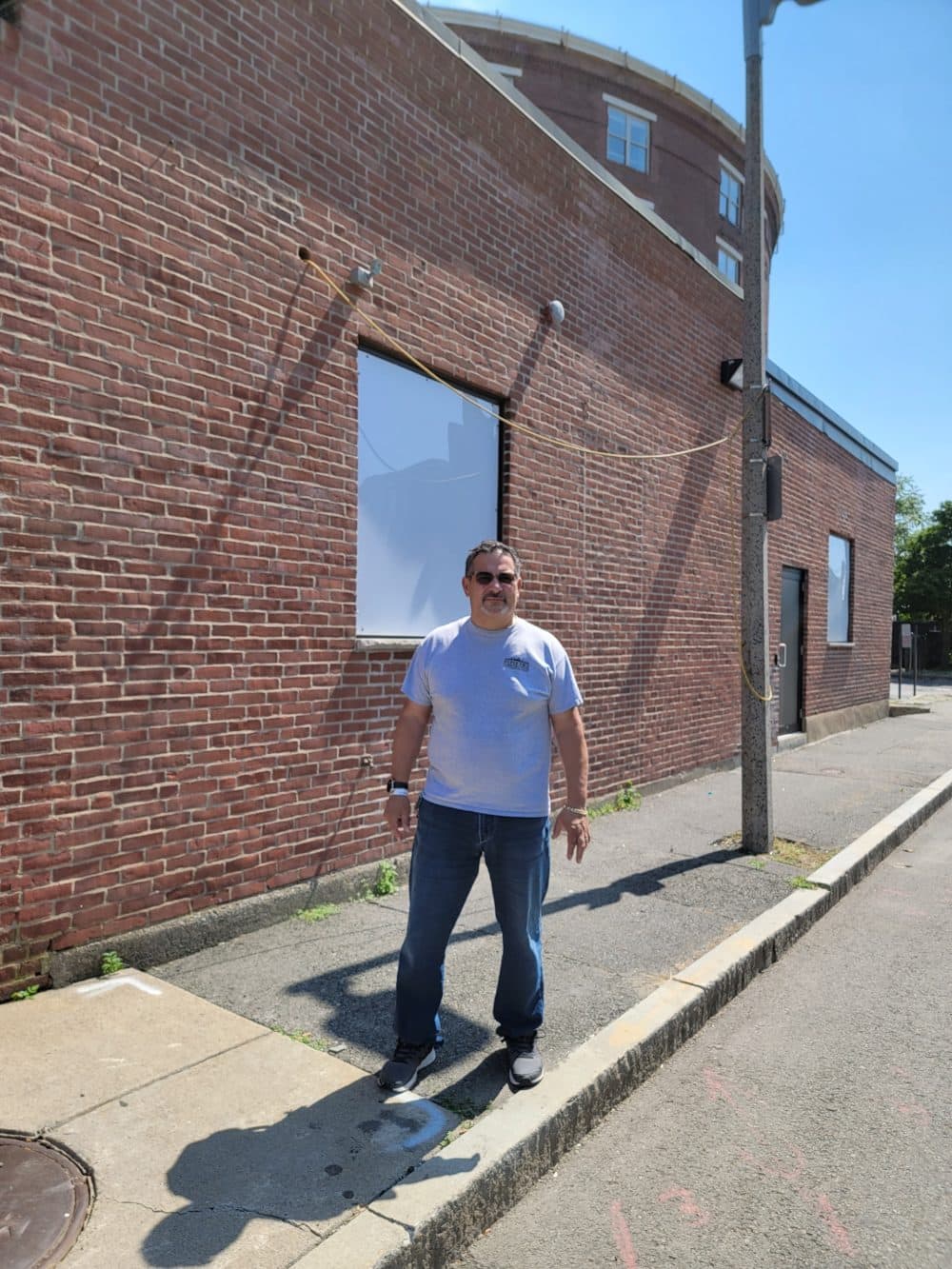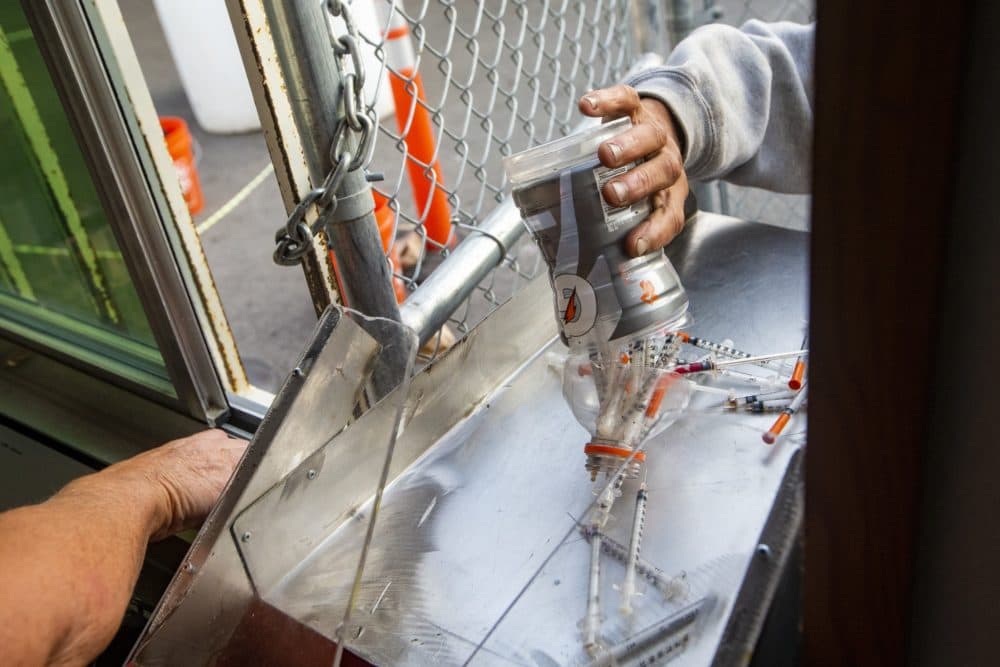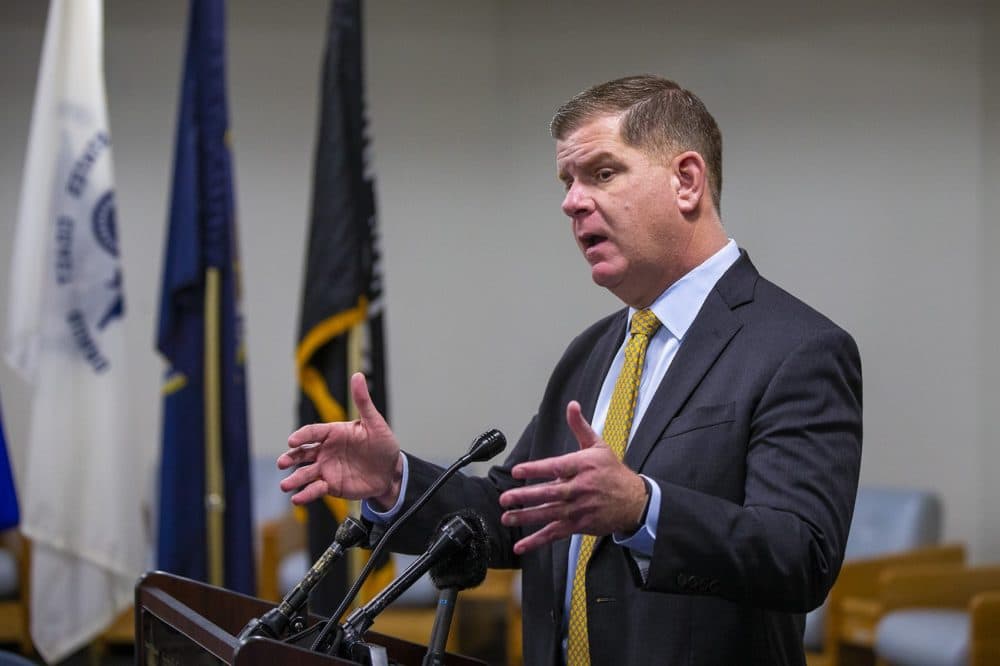Advertisement
Boston Neighbors Hope A New Mayor Can Help One Of The City's Bleakest Neighborhoods

For years, Boston residents have complained that area known as "Mass and Cass" has become the epicenter of the region's opioid epidemic. Now, some say the neighborhood is getting worse, and they wonder whether a new mayor will be able to help change that.
Gerry DiPierro, owner of DiPierro Construction on Massachusetts Avenue, says the decline has been noticeable in the past six months. He observes there are more people openly using drugs. Near his business, DiPierro has found areas full of human excrement, and his offices have been vandalized.
While newly installed city cameras are helping, DiPierro installed plexiglass over some of his windows and estimates he spent $40,000 in the past seven months repairing vans and replacing tools that were stolen from the vehicles.

"It's not safe," DiPierro said. "The people here now are more aggressive. People have been stabbed. I can't keep workers because they're afraid to come here. "
The intersection of Massachusetts Avenue and Melnea Cass Boulevard draws thousands of people who are seeking help at Boston Medical Center, several addiction treatment programs, homeless shelters and other social service agencies nearby. Hundreds reportedly live on the streets.
On some sidewalks, tents are lined up where people are using drugs or dozing. DiPierro often asks them why they're camping out, and says many tell him they are not from Boston but come for the services and then stay.
"They need to find a facility where these people can get help — long-term help for months or even years," DiPierro said. "It's all too concentrated here."
The concentration of services in just these few blocks of "Mass and Cass" has long been a sore point with neighbors and is sure to be a challenge for the city's next mayor. Neighborhood opposition recently shot down a plan for transitional housing at the now-closed Best Western Roundtable Hotel in the neighborhood.
Advertisement
"Every week it seems to get worse. Not even day by day — but hour by hour."
Sarah Porter, Victory Programs
Victory Programs, which has a contract with the state and city to provide transitional housing, proposed renting two floors of the hotel to create up to 35 transition beds. The idea was to provide space for people waiting for permanent housing.
Victory Programs' executive director, Sarah Porter, says she's disappointed that the plan didn't go through, but she's looking at other options nearby.
"Being closer to the source of where people are right now is helpful," Porter said. "So we're looking at other hotels that are a little bit further out of 'Mass and Cass.' But ideally, you want something that's, you know, near where people are."
While there are no official numbers, Porter and others estimate that there are several hundred people now living on the streets around Mass/Cass.
"Every week it seems to get worse," Porter said. "Not even day by day — but hour by hour. I don't think anyone is to blame for that, but we have small solutions that have worked for a few people, and we need to ramp those up."

The city has grappled with the "Mass and Cass" area for years, and it was an issue in the last mayoral election. Many say problems in the neighborhood were exacerbated after the sudden closure in 2014 of the bridge to Long Island, where many social service programs operated.
Two years ago, former Boston Mayor Marty Walsh issued an updated plan known as "Mass-Cass 2.0." Just before that, the city established an "engagement center" near the Southampton Street shelter. The center offers rest rooms, medical help and referrals to addiction treatment.
The city also created a task force to propose solutions for the increasing number of people coming to the area seeking housing, and mental health and substance use treatment. Members say that group has essentially disbanded.

"The 'Mass/Cass' task team is 100% useless," said Suffolk County Sheriff Steven Tompkins, a member of the task force whose jail is in the neighborhood. "Nothing has gotten done."
Tompkins says the group was too large and didn't meet often enough. He says bold steps will have to be taken and efforts coordinated with city and state agencies, and neighborhood leaders. He adds that the next mayor will need to take action because the situation is worsening.
"What's happening in the 'Mass/Cass' area is a human tragedy," Tompkins said. "It's no longer just an open air drug market, which it is. People are not just fornicating and defecating there, which they do — but there has been an element of human trafficking that has been introduced there, so I'm told. I don't see how this gets better by itself."
Acting Mayor Kim Janey has promised to revamp the task force and says her office continues to focus on improving the area. Over the past week, Janey says 55 people have been referred to treatment from Mass/Cass, and police have made more than 30 drug-related arrests. Janey says she is working with state officials and municipal agencies to encourage more services outside of Boston.
"We need not only have to have a coordinated approach in our city but with other municipalities around the region," Janey said on WBUR's Radio Boston. "Addiction knows no boundaries."
"In Boston, it’s the epicenter of pain, sorrow, and tension. It’s not fair to anyone."
John Barros, Boston mayoral candidate
The other four major mayoral candidates are also calling for communities to do more. They've all issued detailed plans for the "Mass and Cass" area and all advocate what they call "a public health approach."
City Councilor Michelle Wu has proposed a regional coalition to deal with mental health and substance use, and she has called for more data on the effectiveness of city efforts to help. She also endorses scaling up regional anti-drug trafficking efforts.
"We’ve lived through the intersectional barriers and complexity of broken systems, and I’m committed to transforming these structures as mayor," Wu said in a campaign platform. "Boston residents deserve compassionate care, urgent action, and accountability."
City Councilor Annissa Essaibi George promises to appoint a "Mass and Cass Czar" if elected mayor, and says she would convene a summit of metro mayors on the opioid epidemic. She also argues that federal American Rescue Plan funds should be used to help.
"With 70% of the population down at Mass & Cass being from outside Boston, Annissa believes that surrounding municipalities need to finally step up and provide the much needed services and resources," said a statement from Essaibi George's campaign. "Boston is bearing an unfair share of the burden."
Another city councilor running for mayor, Andrea Campbell, is proposing a dedicated Mass/Cass first responder unit and streamlining first responder efforts. Campbell also wants to explore ferry service to Long Island and reactivating some of the programs that were shuttered when the bridge closed.
"Opponents dismiss ferries due to concerns about weather and emergencies, but comparable New England cities run ferries year-round, operate on-site infirmaries and use helicopters for medical emergencies in remote locations — Boston can deploy similar best practices," Campbell's campaign proposal on the area said.
The city's former economic development chief, John Barros, says if he becomes mayor he will declare a public health emergency to get more resources in the area. He's also proposing expanded hours at the engagement center.
"All of this adds up to a proliferation of problems including crime, traffic hazards, discarded needles, and litter, making it unsafe and unsanitary for both residents and people seeking services," Barros said in a campaign statement. "In Boston, it’s the epicenter of pain, sorrow, and tension. It’s not fair to anyone."
The state says it has invested more than $30 million since the beginning of this year to address homelessness and other issues, with some of the funds directly going to the area.
"The Baker-Polito Administration works closely with the City of Boston to identify strategies for the challenges faced along the Massachusetts Avenue corridor," said a spokesperson for the Executive Office of Health and Human Services in a statement.
While the city has bolstered security measures and is doing more street cleaning and trash pick up, area business owner Gerry DiPierro and others hope the next mayor will figure out ways to do more. If things don't improve, DiPierro says he'll probably leave.
"I would just sell the building and get out of here and move somewhere else," Dipierro said. "I have kids, and I just don't need something happening."
This segment aired on August 27, 2021.
